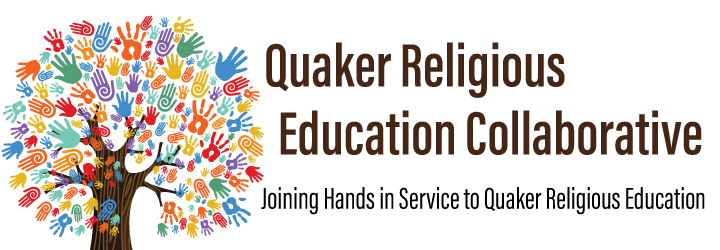February 19, 2019
Welcome and Introductions
Centering Silence
Topic: Drawing on the ancient themes of death, rebirth and resurrection, how can we, as religious educators lift up a Quaker understanding of Lent, Easter and Passover? The mystery of this season, while not easy to enter, can lead to personal and social transformation if the way is prepared. Discuss the challenges posed by the sacred stories of this season, learn from others and share successes and promising practices in your meeting.
Beth C: Modern Quakers may experience barriers to the Easter story with its emphasis on the miraculous, but science also holds deep mystery. For instance, astronomists tell us that the universe was formed in an instant from something the size of a walnut. The Easter mystery can have its own place in our world. As Quakers we can help our Meetings breathe in the power and mystery of these stories. We can sit with the sense of loss of control that can come with accepting a gift of such magnitude, the death of Jesus. We can help children and adults in our Meetings breathe in the transformative power of sacrificial love.
Melinda WB: We welcome three Kenyan Friends to the call. In January, Beth and I attended a conference at Friends Theological Seminary in Kaimosi, Kenya. 24 Kenyan Friends participated in a workshop from which came a leading to form QREC East Africa.
As a Godly Play practitioner, I’m accustomed to a hands-on method of exploring the Bible with children, but the Godly Play stories go quickly through Jesus’s story: He’s born, tells a few parables and then we’re at Easter. As Friends, the Faith & Play working group sensed the need for a story that would help Quaker children come close to the mystery of Easter. We created a story using the images of winter and spring (which works in the northern hemisphere) transformed into symbols of Easter. The message is that with the resurrection we can know Jesus in a new way; his teaching is with us always.
For liberal Friends there can be tension around the symbols of Easter such as resistance to the cross. But I feel that our children will encounter the cross in the course of their lives and they need to be able to process the symbol. Marsha Holliday pointed out that there is no more Quakerly Bible story than Pentecost, the coming of fire and light. See Resources at the end of these notes.
Conversation:
- How do we come as contemporary Friends to the ancient themes of death, rebirth and resurrection?
- How can we, as religious educators open the way to a Quaker understanding of Lent, Easter and Passover?
- How do we prepare ourselves to enter the mystery and carry something of Easter beyond the holiday in a way that feels authentic and faithful?
- How can we care for families holding multiple faith traditions only one of which is Quaker?
Katie G expressed appreciation for the Easter Story for Friends. Her experience in New England was that youth don’t understand the resurrection.
Beth C recommended The Light of the World, by Katherine Paterson, which tells the story of Jesus’ ministry in a Quaker-friendly way. We need a Quaker parent resource about how to talk with children about Easter.
Judith N described teaching about Easter in Kenya. “We teach the Holy Week story about the crucifixion, death and resurrection. We teach that Jesus died for our sins, that we are all resurrected and given a new life. We can overcome challenges with help from the Holy Spirit. We teach that God gave us the Light.”
Beth C: The central theme of the experience of Easter is that we are profoundly changed by the new life through Jesus’ life, ministry and death. We can help Easter come alive for the children, youth and families we work with.
Cassandra F is from a liberal Friends Meeting and grew up in the Southern Baptist tradition and is familiar with literal interpretation of scripture. She is planning work on the life of Jesus. She has a personal interpretation of the questions, “What does it mean to say, ‘I believe in Jesus?’” or “What is the resurrection?” We need to tell young Friends that they are God’s Spirit in the world; the Spirit will work through them. That’s distinct from the Baptist emphasis on sin, which they hear as, “I am bad if I don’t do what I’m told to do.” The world needs constant reference to meaningful experience of the Divine. We have let science and worldliness take over from the spiritual. We need to teach children to encounter the Divine.
Andrew W: There are different ways to teach the story, one for younger children and another for youth. He favors the Holy Week Story as told in the gospel of Mark. In his Meeting, 4th and 5th graders know the gospel. He helps bring to life what happened at Easter, rather than keeping it at too much of an abstract level of mystery.
- Jesus is confronting authority in the temple. He takes courageous action.
- A big column of smoke rises from the temple, the sacrifice of animals,
- The city of Jerusalem is jammed with crowds because of the Passover,
- Hundreds of people are crucified at Passover, not just Jesus.
Resource for adults: The Last Week, by John Crosson and Marcus Borg, about the Holy Week Story as unfolded in the gospel of Mark.
Katie G: Recommends, Abraham’s Bind: & Other Bible Tales of Trickery, Folly, Mercy and Love.
by Michael Caduto, Bible stories in a Native American style.
Beth: These stories are sensitive enough that it is best to prepare parents and the Meeting beforehand. It’s wise to host a coffee hour to explain what you are doing and why. Beth suggested that she, Katie and Harriet facilitate a workshop on “Gospel Stories for Parents,” for the NEYM Session.
Katie G: It’s important that children not lose track of the roots of Quakerism, the Bible stories.
Melinda WB: Yes, one case for approaches to Bible stories in Quaker RE is that they are a point of intersection for Friends cross-branch and worldwide. However, parents and other adults in Meetings who have had negative experiences with the Bible as children may be wary. It’s important to help them understand that we use an experiential, non-doctrinaire approach and why.
Dancan S: Neither children nor adults take time to read the Bible. They have limited knowledge. It is important to help parents and kids read the stories together, to give them simple resources to share the Bible stories. Parents are often willing, but they may not know how.
Melinda WB: The Godly Play Foundation has published a new book, Stories of God at Home with simple materials. The book acknowledges the primacy of parents as teachers and pastors for their children. Parents may not feel they have the skills to teach RE, and this helps them. It’s not necessary to do the Godly Play approach, but that’s just one suggestion. As a parent, I told pieces of the advent story every Sunday evening. We would sit on the floor and there was a spirit of shared search.
Sita D: Something similar could take place during Lent, Holy Week and Easter. The story has so many parts that it is important to break it up in order to absorb it.
Melinda WB: In our resources section, see Holy Week in a Box, which we as Quakers adapted from the Episcopalians. The box could be in a prominent place and taken out in the evenings for shared exploration of the story.
Judith N: Godly Play can be used to empower parents at home. Can we have seminars to teach parents the importance of knowing the stories to share and teach their children?
Melinda: Whether or not you use Godly Play, you can invite parents to story telling sessions. Tell the story, then “Go up on the balcony” to explain how to tell the story and help them practice.
Sarah WK: I need that whole book. We lost a child to death. Vincent was an orphan; he lived in an orphanage. The children in my class had many hard questions like, “If Jesus died for sinners, why did Vincent die so young? He was good and kind.” I worry about telling the Easter story because when we tell stories of death, questions like this come up. I don’t know how to respond. Vincent died in November. I’m afraid we will push the children back into mourning.
Beth C: Any death reminds us of other deaths in our life. We can say, “There are many things that seem unfair; many things none of us understand.”
Dancan S: Kids get stuff from the Internet and from their friends that is beyond their capacity to understand, and is likely to cause confusion. Bring in something on the subject of death that is appropriate for their age.
Yani Z: It is good to say, “I don’t know either. Let’s pray.”
Judith: Death does not come because we are sinners. Children should know that the child has gone to be with God. God can come for you at any time and we should be ready. Sunday school teachers should be empowered to deal with hard questions. If you leave them hanging, they won’t be able to trust you as much.
Sita D: The Sparkling Still section of the Friends General Conference website (https://www.youtube.com/watch?v=U667oFSoNC0) has a searchable online library of children’s books: https://www.fgcquaker.org/deepen/religious-education/sparkling-still/sparkling-still-librarything-collection . There are also sample lesson plans to deal with hard questions such as death.
Sally F: A good book about death is Nana Upstairs, Nana Downstairs, by Tomie de Paola. It’s about a great grandmother and a grandmother who die of old age, but the message can help with younger deaths. YouTube: https://video.search.yahoo.com/yhs/search?hsimp=yhs-att_001&hspart=att&p=nana+upstairs+nana+downstairs+YouTube#id=3&vid=ec7fc9b0010d0898cf61110c6b28d8f0&action=view
Friends were asked to email suggestions for newly published books to quakercollaborative4RE@gmail.com.
After the call, Katie sent the following poem from Kathleen O’Rourke’s book, What I’ve Seen: Animal, Nature, and Ranger Tales:
Death
The old Hopi Indian said, “life is a circle
and when we die, the circle is completed.”
Navaho friends also told of this circle of life
ending in death: “We are all born with our own circle,
some very big, some very small.
It is different for each person,
only The Great Mystery knows our circle.”
That winter, on the reservation:
A baby nine days old stopped breathing at night.
A drunken young Navaho drove off the road into a rock wall.
The old man who ran the trading post was shot in a robbery.
The Indians grieved quietly, spoke in low voices,
and nodded to one another without using words.
Woven within this was always the gentle humor
that accompanies all of life.
There was no speaking of:
– Not fair
– Too soon
– Such a shame
Or, Why, Why, Why?
No need for questions when the circle has been completed
At nine days, at 17 years old, at 65.
Announcement: March Conversation Circle: Supporting children with learning differences and autism
Facilitator: Beth Collea, Wellesley Monthly Meeting, NEYM
- Tuesday, 3/19, 1:00 PM US Eastern time
- Thursday, 3/21, 8:00 PM US Eastern time
Thanks, request to send resources and review notes prior to posting in the QREC website
Closing Worship
|
Name |
Meeting-Organization |
|
Beth Collea |
Wellesley MA, NEYM |
|
Sita Diehl |
Madison WI, NYM |
|
Sallie Farneth |
Middletown, Langhorne PA, PhYM |
|
Cassandra Fralix |
Columbia SC, SEYM |
|
Katie Green |
Clearwater FL, SEYM |
|
Harriet Heath |
Schoodic FM, NEYM |
|
Sallie Jones |
Birmingham PA, PhYM |
|
Sarah Wanjiri Kamau |
Kenya YM |
|
Faith Kelley |
Berkeley CA, PacYM |
|
Judith Nandikove |
Nairobi, Kenya YM |
|
Gwynne Ormsby |
Birmingham, PA, PhYM |
|
Dancan Sabwa |
Kitale MM, North Kenya YM |
|
Serita Spadoni |
Birmingham, PA, PhYM |
|
Melinda Wenner Bradley |
West Chester PA, PhYM |
|
Andrew Wright |
Durham NC Conservative |
|
Greg Woods |
Cambridge FM, NEYM |
|
Yani Zamora |
Cambridge FM, NEYM |
February 21, 2019
Welcome and Introductions
Centering Silence
Topic: Drawing on the ancient themes of death, rebirth and resurrection, how can we, as religious educators lift up a Quaker understanding of Lent, Easter and Passover? The mystery of this season, while not easy to enter, can lead to personal and social transformation if the way is prepared. Discuss the challenges posed by the sacred stories of this season, learn from others and share successes and promising practices in your meeting.
Beth C: Modern Quakers may experience barriers to the Easter story with its emphasis on the miraculous, but science also holds deep mystery. For instance, astronomists tell us that the universe was formed in an instant from something the size of a walnut. The Easter mystery can have its own place in our world. As Quakers we can help our Meetings breathe in the power and mystery of these stories. We can sit with the sense of loss of control that can come with accepting a gift of such magnitude, the death of Jesus. We can help children and adults in our Meetings breathe in the transformative power of sacrificial love.
Melinda WB: As a Godly Play practitioner, I’m accustomed to a hands-on method of exploring the Bible with children, but the Godly Play stories go quickly through Jesus’ story: He’s born, tells parables and then we’re at Easter. As Friends, the Faith & Play working group sensed the need for a story that would help Quaker children come close to the mystery of Easter. We created a story using the images of winter and spring (which works in the northern hemisphere) transformed into symbols of Easter. The message is that with the resurrection we can know Jesus in a new way; his teaching is with us always.
For liberal Friends there can be tension around the symbols of Easter such as resistance to the cross. But I feel that our children will encounter the cross in the course of their lives and they need to be able to process the symbol. Marsha Holliday pointed out that there is no more Quakerly Bible story than Pentecost, the coming of fire and light. See Resources at the end of these notes.
Conversation:
- How do we come as contemporary Friends to the ancient themes of death, rebirth and resurrection?
- How can we, as religious educators open the way to a Quaker understanding of Lent, Easter and Passover?
- How do we prepare ourselves to enter the mystery and carry something of Easter beyond the holiday in a way that feels authentic and faithful?
- How can we care for families holding multiple faith traditions only one of which is Quaker?
Points:
- Lent, Easter, and Passover are challenging. These celebrations can no long be at odds with science and psychology; yet, they are a mystery.
- The symbol and reality of the Cross are “hard things” to deal with.
- Where does one find oneself in the death and resurrection story…on the Road to Emmaus, sensing the Presence walking with us in daily life?
- This season is a celebration of the life and testimony of Jesus.
- Combine with Earth Day Celebrations
- Teens are questioning and have dissenting voices. Karen Greenler paired the Creation story in Genesis with the Big Bang theory to show how similar truths can be conveyed in very different ways.
- Fasting during Lent is contrary to Jesus’ message and ministry of enough food for everyone.
- The sacred is everywhere.
- Pentecost is the Quaker holiday. One Friend uses red hot candies to dramatize fire on our tongues.
- “I know that my redeemer liveth.”
- “Let your heart guide you through this time.”
- Like Jesus Christ, many of us suffer. Suffering and sacrifice can be a time of deepening awareness and spiritual growth for the individual and others around them.
Friends were asked to email resource suggestions to quakercollaborative4RE@gmail.com .
Announcement: March Conversation Circle: Supporting children with learning differences and autism
Facilitator: Beth Collea, Wellesley Monthly Meeting, NEYM
- Tuesday, 3/19, 1:00 PM US Eastern time
- Thursday, 3/21, 8:00 PM US Eastern time
Thanks, request to send resources and review notes prior to posting in the QREC website
Closing Worship
Recommended Resources:
- Easter Story for Friends (Faith & Play): http://quakers4re.org/find-resources/easter-story-friends-story-about-power-god%E2%80%99s-love
- Exploring Godly Play Stories for Lent, Melinda Wenner Bradley, PYM: http://quakers4re.org/sites/default/files/resources/GP%20Lent%20and%20Easter.MWB_.pdf
- Easter Light: A set of queries for Lent and Easter, by Debbie Pryor, Wellesley Friends Meeting: http://quakers4re.org/sites/default/files/Easter_Light.WFM_.pdf
- An Introduction to the Life of Jesus for Quakers, Inspired by the Musical Godspell on “KidsQuake‚Äù from the Friends Media Project.
- Holy Week in a Box: http://quakers4re.org/find-resources/holy-week-box?return_path=/find-resources%3Fkeys%3D%7C~%7Cpage%3D1
- Wellesley Friends Seder: http://quakers4re.org/find-resources/wellesley-friends-seder
- The Lord’s Prayer: Learning the World Jesus Taught, by Adam Thomas: https://wherethewind.com/2017/09/27/the-lords-prayer-learning-the-words-jesus-taught-2/
- Psalm Twenty-Three illustrated by Tim Ladwig: https://www.goodreads.com/book/show/1359687.Psalm_Twenty_Three
- The Light of the World, by Katherine Paterson: http://littlebookbigstory.com/the-light-of-the-world-by-katherine-paterson/
- The Last Week: What the Gospels Really Teach About Jesus’s Final Days in Jerusalem, by John Crossan and Marcus Borg: https://www.goodreads.com/book/show/103340.The_Last_Week
- Abraham’s Bind: & Other Bible Tales of Trickery, Folly, Mercy and Love, by Michael Caduto, https://www.amazon.com/Abrahams-Bind-Other-Bible-Trickery/dp/1594731861
- In the Beginning: The story of Genesis and Earth Activities for Children, by Michael Caduto. https://www.worldcat.org/title/in-the-beginning-the-story-of-genesis-and-earth-activities-for-children/oclc/54767412
- A Child of God: Stories of Jesus and Stewardship Activities, by Michael Caduto. https://www.commonword.ca/ResourceView/2/11030
- Sparkling Still on the Friends General Conference website: https://www.youtube.com/watch?v=U667oFSoNC0. Searchable online library of children’s books: https://www.fgcquaker.org/deepen/religious-education/sparkling-still/sparkling-still-librarything-collection
- Stories of God at Home: A Godly Play Approach, Godly Play Foundation: https://www.godlyplayfoundation.org/stories-of-god-at-home-is-here/
- Nana Upstairs, Nana Downstairs, by Tomie de Paola: https://www.goodreads.com/book/show/98407.Nana_Upstairs_and_Nana_Downstairs



